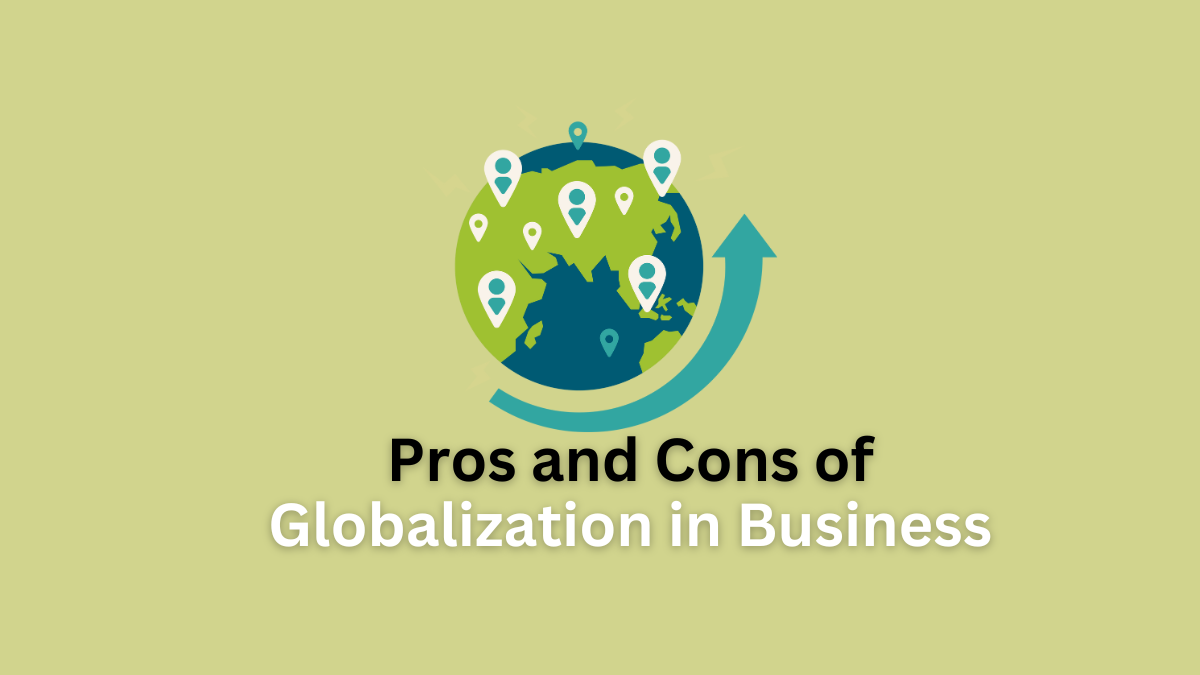Pros and Cons of Globalization
Globalization refers to the process by which businesses, cultures, and governments worldwide become interconnected and interdependent through increased trade, communication, and technology. It involves the integration of markets, capital, ideas, and labor across international borders, leading to greater economic, social, and cultural exchanges and influences globally.
Here we will discuss the 10 main pros and cons of globalization in business, so let’s get started:
Main Pros of Globalization in Business
The following are the main advantages of globalization of business:
Increased Market Access
Globalization enables businesses to enter and operate in new markets around the world. This increased access allows companies to tap into larger customer bases, diversify their revenue streams, and reduce dependence on their domestic markets.
For instance, a company in the United States can now easily sell its products in Europe, Asia, and Africa, reaching millions of new customers. This expansion often leads to increased sales and higher profits, which can be reinvested into further business growth.
Cost Efficiency and Economies of Scale
By operating on a global scale, businesses can achieve cost efficiencies through economies of scale. This means producing goods or services in larger quantities, which reduces the cost per unit. Additionally, companies can source materials and labor from countries where these inputs are cheaper, lowering overall production costs.
For example, many technology firms manufacture components in countries like China and India, where labor costs are significantly lower than in the United States or Europe, thus reducing their production expenses.
Innovation and Technological Advancement
Globalization fosters an environment of increased competition, which drives innovation and technological advancement. Businesses are pushed to innovate to stay competitive in the global market.
Moreover, globalization facilitates the spread of new technologies and ideas across borders, enabling companies to adopt best practices and cutting-edge technologies from around the world. This constant drive for improvement helps companies to enhance their product offerings and operational efficiencies.
Diversification of Risk
By operating in multiple countries, businesses can diversify their risk. Economic downturns, political instability, or natural disasters in one region may not severely impact a company that has a presence in several other stable regions.
This geographic diversification helps to mitigate risks and ensure more stable revenues. For example, if a European market faces an economic recession, a company with operations in Asia or South America can still maintain its financial stability through sales in those regions.
Access to the Global Talent Pool
Globalization allows businesses to access a wider and more diverse talent pool. Companies can hire skilled workers from different parts of the world, bringing in varied perspectives and expertise.
This diversity can enhance creativity and innovation within the organization. For instance, many technology firms in Silicon Valley hire engineers from countries like India, China, and Eastern Europe, benefiting from their specialized skills and knowledge.
Main Cons of Globalization in Business
With notable benefits, globalization also has its drawbacks. The following are the five main disadvantages of globalization of business:
Job Offshoring and Domestic Job Losses
One significant downside of globalization is the offshoring of jobs to countries with lower labor costs. While this practice can reduce costs for businesses, it often leads to job losses in the company’s home country, causing economic and social challenges.
For example, manufacturing jobs in the United States have significantly declined as companies have moved production to countries like China and Mexico, where labor is cheaper. This has resulted in higher unemployment rates and economic decline in some regions.
Increased Competition
While competition can drive innovation, it can also be detrimental to smaller or less competitive businesses. Globalization opens domestic markets to international competitors, making it harder for local companies to survive.
Large multinational corporations, with their significant resources and economies of scale, often dominate markets, pushing smaller companies out of business. This can lead to reduced market diversity and less choice for consumers.
Environmental Impact
Globalization often leads to increased industrial activity and transportation, contributing to environmental degradation. The rise in production and shipping of goods across long distances results in higher greenhouse gas emissions and pollution.
For example, the fast fashion industry has seen a boom due to globalization, leading to severe environmental issues such as water pollution, excessive waste, and high carbon emissions from global supply chains.
Cultural Homogenization
The spread of global brands and media can lead to cultural homogenization, where local traditions, cultures, and identities are overshadowed by a dominant global culture. This can result in the loss of cultural diversity and heritage.
For instance, the proliferation of Western fast-food chains like McDonald’s and Starbucks in various countries has sometimes overshadowed local culinary traditions and businesses.
Dependency on Global Markets
Businesses that heavily rely on global markets can become vulnerable to international market fluctuations, political changes, and economic crises. Events like trade wars, pandemics, or geopolitical tensions can disrupt global supply chains and affect business operations.
The COVID-19 pandemic, for example, exposed the vulnerabilities of global supply chains, leading to significant disruptions in production and distribution for companies worldwide.
In conclusion, globalization in business offers substantial benefits, such as increased market access, cost efficiency, innovation, risk diversification, and access to a global talent pool. However, it also presents significant challenges, including job offshoring, increased competition, environmental impact, cultural homogenization, and dependency on global markets. Balancing these pros and cons is crucial for businesses to navigate the complex landscape of globalization successfully.
Read Next: 10 Major Pros and Cons of Job Specialization
